Summary: Hiring a remote software development team can be a boon for your business. With advantages including cost savings, time, a wider pool of talent, and more – a dedicated remote software development team can work wonders for you. How to go about it? Let’s dive into this mammoth information we’ve compiled for businesses like yours. Shall we?
Hiring a remote software development team is a cost-effective way to bring websites, apps, and online platforms to life… but only if you do it right!
Real talk—the remote team you choose could make or break your business, so do not rush the selection process. You could have your hands on the next big idea, but if you hire a software development team who can’t think strategically, understand your vision, and/or future-proof your digital products? You’re starting behind the eight ball.
The good news is that countless organizations have successfully hired remote development teams worldwide. Here at Net Solutions, we’ve worked with major brands like Nike, Unilever, Yahoo, and the Harvard Business Review, along with countless startups that have done great things.

If you approach this strategically, you can hire a remote software development team that delivers superior products quickly for less than you’d spend on an in-house team. This guide tells you how to set up a software development team.
The global business process outsourcing market size is anticipated to reach USD 525.2 billion by 2030 and expand at a CAGR of 9.4% from 2023 to 2030.– Grandview research
Advantages of dedicated software teams
What is a dedicated software team?
A dedicated software team is an outsourced team that typically works full-time on a specific project. The relationship might wrap up after launch or continue for years with the dedicated team performing maintenance and improving the product based on customer feedback.

We respect your privacy. Your information is safe.
What does a remote software team do?
Dedicated software teams may include Business Analysts, Designers, and UX professionals who work alongside front-end and back-end Software Engineers. As a client, you will typically interact with the Project Manager who oversees everything, providing regular updates, incorporating your feedback, and keeping your vision on track.
Of course, your exact software development team structure will depend on the project’s needs since modern software development team structures vary from organization to organization.
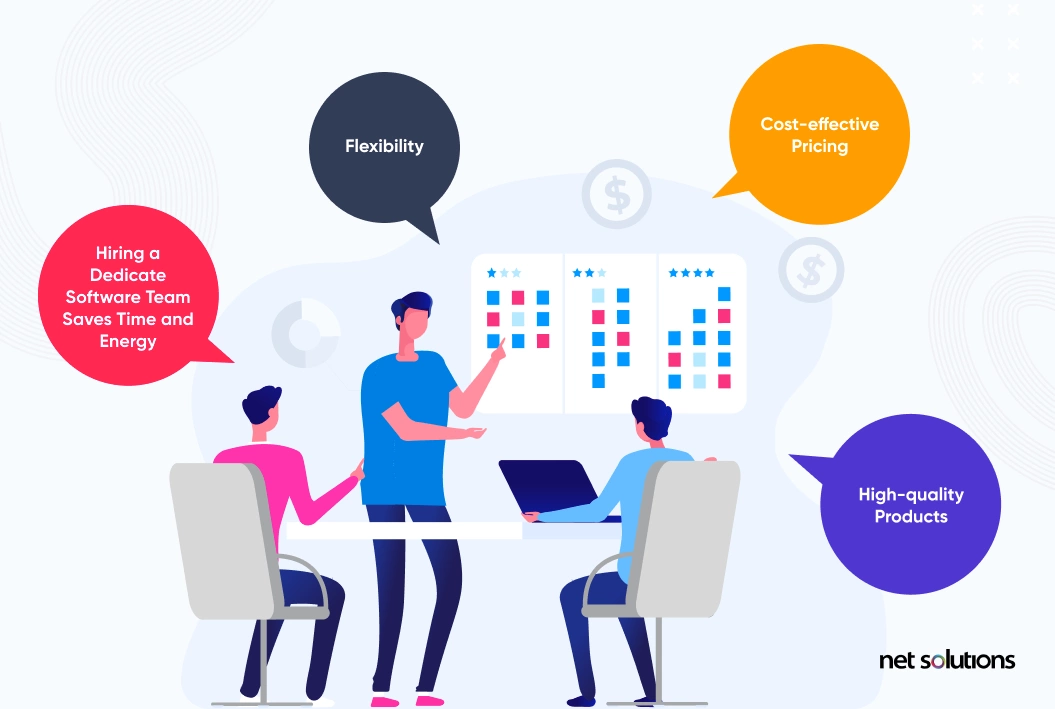
The following are some advantages of hiring a dedicated software team.
1. Saves time and energy
Hiring a dedicated software team is much easier than forming your team in-house because you don’t have to interview candidates, hire each member individually, or handle all those HR and compliance issues (vacation, sick leave, benefits, unemployment insurance, etc.).
Plus, you’re free from managing each employee’s day-to-day work. The agency that manages your dedicated team will handle everything, so you can focus on what you do best.
2. Cost-effective
Outsourcing software development is incredibly cost-effective, assuming you hire the right team. Hiring an incompetent team could cost you more in the long run because you’ll spend money and waste time fixing their mistakes.
That said, a credible team with a solid track record can save you money because:
- You aren’t responsible for payroll taxes, benefits, etc.
- Hiring, firing, and other HR responsibilities take time, and time is money.
- Many highly professional agencies operate in parts of the world where the cost of living is lower, which translates to lower operating costs and more competitive pricing.
3. High-quality products
Working with a dedicated software team often results in higher-quality digital products than those built by newly formed in-house teams. This is because an experienced, dedicated software team has worked on many projects together. They have systems in place, methodologies they follow, and they know how to work with clients to translate ideas into superior products.
A good remote development team will also advise you on your strategy. For example, if a Minimum Viable Product (MVP) makes sense for your first release, a solid partner will float that idea and discuss the pros and cons.
4. Flexibility
Flexibility is one of the significant reasons companies outsource software development. This productive period can help businesses grow with a limited staff, allowing them to serve customers for an extended timeline without needing to hire more employees.
Global spending on outsourcing could hit $731 billion in 2023.– Deloitte.
Where to find a remote development team?
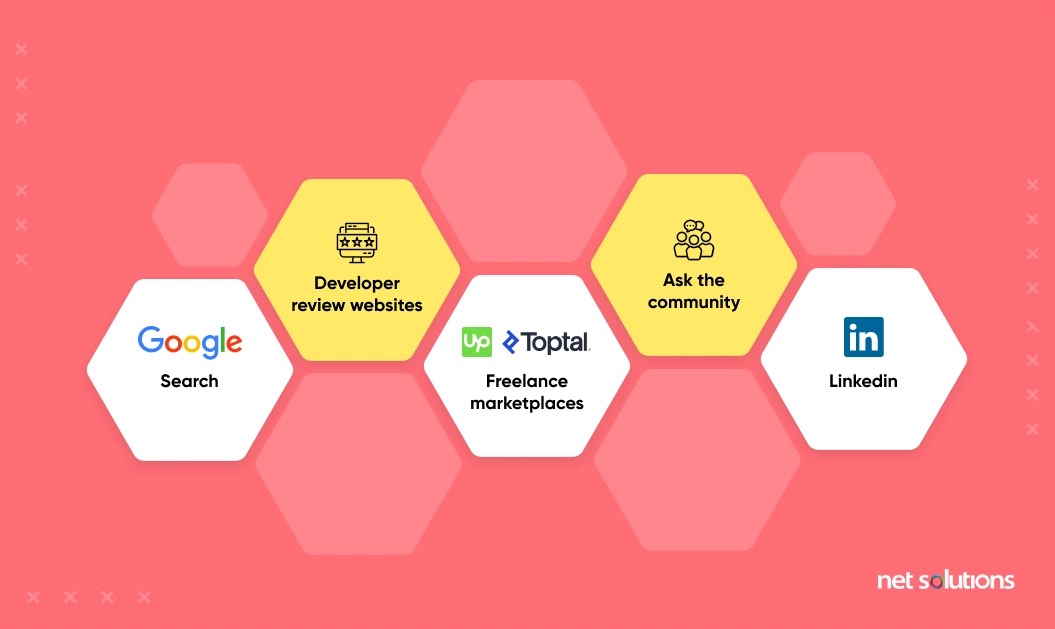
Now that you’ve decided to use a remote development team to build your digital product. Where do you go to find a good team?
The following resources will help you get started. Read the following sections to learn how to select your candidates and thoroughly vet them.
1. Google search
Perhaps you’ve heard of a small, fledgling search engine called Google? Kidding, of course.
There’s a good chance you found this post from a Google search. Google is a great place to start your search, and if a development firm’s content shows up on the first page, they at least know a thing or two about Search Engine Optimization (SEO).
2. Developer review websites
Review sites like G2 and Clutch feature independent client reviews for development firms worldwide, with objective information about each firm (e.g., company size, portfolio, location, and major clientele).
3. Freelance Marketplaces
You’re probably familiar with freelance marketplaces like Upwork and Toptal, and you can find some excellent talent there.
A. Upwork
Upwork helps businesses hire freelancers worldwide for all kinds of projects (not just tech projects). It can plug you into a wide network of talented software developers, and when you work with Upwork you’ll benefit from their legal protection.
On the downside? Anyone can sign up for an Upwork seller account, and some developers might not have all the skills they claim to have. Be sure to read customer reviews before hiring someone on Upwork.
B. Toptal
Toptal is usually more expensive than Upwork, but they rigorously screen their candidates, giving you access to only the top talent (hence the name). This is a very different business model from Upwork and other popular freelance marketplaces.
Remember that these websites only work well if you want to hand-select each member of your outsourced development team—rather than hiring an agency that already has a team. If you’re trying to figure out how to build a software development team on your own, Upwork and Toptal are good places to start.
That said, choosing individual team members can add to your workload and might not be cost-effective unless you outsource one or two specific roles.
C. LinkedIn
It wasn’t long ago that LinkedIn was the boring social network nobody cared about, but times have changed. Today, LinkedIn is a powerful resource for full-time job seekers and salespeople, hiring managers, entrepreneurs, and HR professionals.
LinkedIn has extensive tools for finding freelancers as well as full-time employees. You can also access discussion groups that might connect you with suitable freelancers. You can do a fair bit with your free account or additional access functionality with paid subscriptions designed for recruiters.
4. Ask the Community
A great way to find remote software developers is to reach out to others who have hired them. We mentioned LinkedIn groups above, but you can also join Facebook groups, ask questions on Quora, attend online and offline events, and ask people you’ve done business with in the past.
Best countries to hire remote software developers
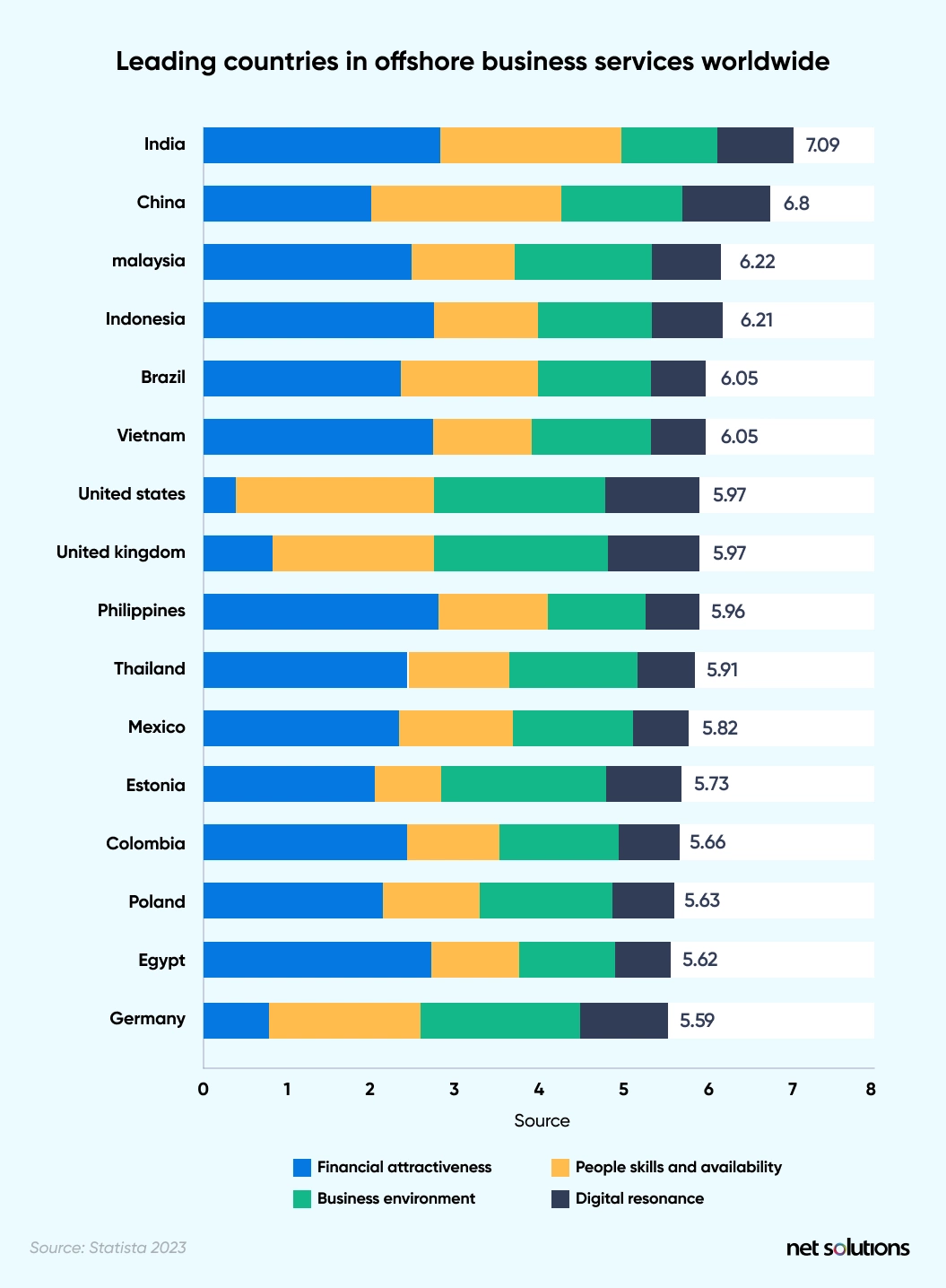
Okay, full disclosure: Net Solutions is headquartered in India, so naturally, we’re big fans of outsourcing to India. It’s a country with an extremely high level of English fluency, virtually eliminating communication errors. Plus, Indian firms can offer competitive pricing.
Owing to its financial attractiveness and availability of staff and skills, India was considered the most attractive destination for offshore business services, with a score of 2.83 and 2.18, respectively.— Statista.
Of course, you have plenty of choices regarding outsourcing. The above countries are some of your best options for balancing price, talent, and quality. Consider the pointers below before looking for a dedicated software development team for your business.
Ensure you have
- a clear idea of what skill set your company or project requires
- the government laws and regulations
enforced expectation settings before finalizing the team
contemplated the language barriers and cultural differences
laid terms and conditions related to your business or project
Why are these countries preferred for remote software development, and their advantages?
Businesses’ primary reason and motivation to outsource their operations are to reduce payroll costs and other overheads. India has a lower payroll rate than other countries, such as Australia, Canada, the United States, and England. They acquire skilled and talented labor at a meager cost, which is the primary reason for outsourcing to India.
Brazil’s internet infrastructure has grown dramatically in recent years. The 2017 Brazilian legislation on outsourcing permits businesses to employ outsourced workers to carry out their core and non-core functions. You can hire Brazilian freelancers to work on your company’s core operations. Mexico is a favored nearshoring destination for businesses based in the US. With a flourishing IT industry, Malaysia is a growing outsourcing market. It comes third in the 2021 Kearney Global Services Location Index because of its improved digital capabilities.
Regardless of which country you choose, your development team will shift their work hours to meet your needs better. We do that for our clients here at Net Solutions when they need it.
Of course, some of our clients prefer to have us work while they sleep—especially when we’re doing QA testing for products built by an in-house team. It all comes down to your individual needs, so wherever you outsource your software development, ensure you find someone who can accommodate you.
How to hire a software development team (7 steps)
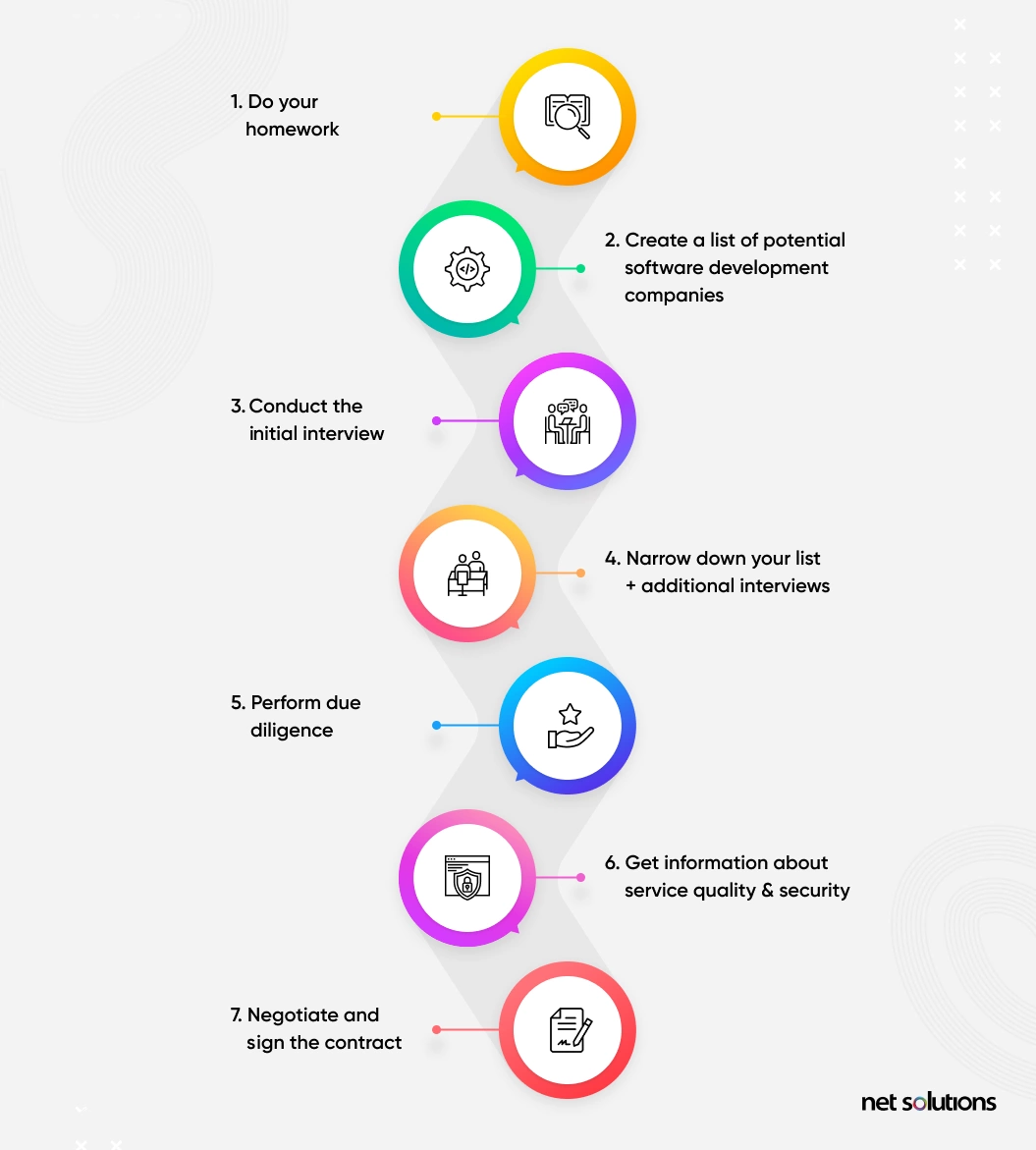
Don’t get married on the first date. If you talk to a sales rep at a firm and you connect well, that’s a great start!
However, you will work with your team for months, years, or maybe decades. You can’t rush this process.
Systematically work through the following seven steps to ensure you’ve got a team who can think strategically, translate your vision, manage your projects properly, and future-proof your business.
Step 1: Do your homework
What do you want to accomplish? Don’t just think about the app, platform, or website you want to create. Think about your ultimate business goals and how you want to achieve them.
Do you want to create a bare-bone MVP to see how users respond before you sink money into developing a more robust product based on their feedback? Do you have a target audience in mind? Who are your competitors?
You might not have an answer to all these questions, and that’s fine. A good firm can help you clarify your vision. Just do your best to flesh out your idea, and then build a Request for Proposal (RFP) outlining everything. When you send a thorough RFP to potential partners, they can provide a more accurate quote.
Step 2: Create a list of potential software development companies
Use all the resources to develop a list of potential tech partners, identifying the pros and cons of each candidate. You can gather intelligence by
- Studying each company’s website
- Reviewing their portfolios (paying particular attention to similar work),
- Reading client reviews on websites like G2 and Clutch
Once you come up with a list of candidates, send out your RFP and see who responds and what they say.
Step 3: Conduct the initial interview

A live interview is a must, preferably via Zoom or some other video chat. Does the company contact seem easy to talk to? Do they openly answer your questions? Does this feel like someone you can trust as a partner?
Here’s a short (by no means exhaustive) list of qualities to look for during the interview:
- Curiosity (asking probing questions to understand your vision)
- Communication skills (including language fluency)
- Rapport (how easily does the conversation flow?)
- Big picture understanding (do they get what you’re trying to accomplish?)
- Software development methodologies they employ. For example, would an Agile approach (working in sprints) be ideal for your project?
Step 4: Narrow down your list + additional interviews
You’ll want to schedule additional interviews with the top picks as you narrow down your candidates. This means speaking with various team members (e.g., Project Managers, Business Analysts, Designers, and Developers) to understand their work and whether they’re a good fit. Don’t be afraid to ask technical questions to test each member’s knowledge.
This is an exciting time since you’ll likely have narrowed it down to one or two front-runners, but don’t jump the gun and sign right away. It’s due diligence time!
Step 5: Perform due diligence
Ask for references—you can chat with past clients and learn about their experience. Naturally, anyone the firm would list as a reference will probably be a fan of the company’s work. Still, if you dig deeper and ask tough questions, you will likely uncover valuable information.
Was there anything they could have improved upon? If the client is no longer working with them, why not? Try to ask open-ended questions and get them talking. That’s when people open up.
Step 6: Get information about service quality & security
Ensure that whoever you work with has thorough systems for handling data and server security, including defined coding and QA testing processes.
Specifically, you’ll want to ask about:
- Coding standards
- Coding review practices
- Code refactoring
- Server administration infrastructure
- Data Security practices
- Data storage and how they protect vulnerable data
- Information management within the organization, such as access levels for different employees, regular password update requirements, etc.
Step 7: Negotiate and sign the contract
Once you’ve found your dedicated software development team, it’s time to sign the contract. Since this could be a lengthy engagement, there will be quite a few details to outline. With this in mind, have an attorney review the contract to ensure your interests are represented.
How to manage a remote software development team
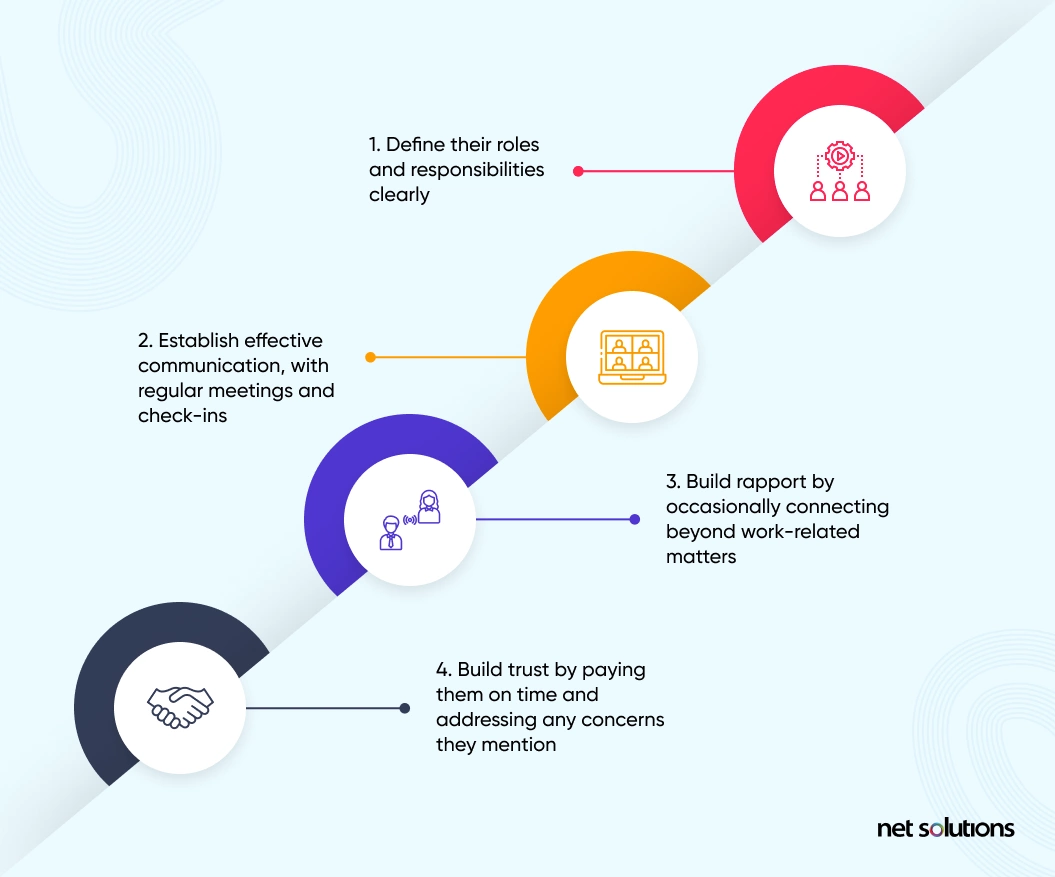
Ever since Covid-19 changed the way we work, we’ve all become much familiar with the benefits and the challenges of working on a remote team.
If you’re working with a dedicated development team, you won’t have to worry about the day-to-day operations—your project manager will take care of that. Still, you’ll want to develop regular communication with that project manager. Plus, there will be times when you’ll interact directly with team members, from Business Analysts to Designers, so they can receive input and direction from you.
Now, if you’re building your remote team using contractors you’ve hired yourself, that’s a different story. Since you will be managing their day-to-day work, you’ll want to:
- Define their roles and responsibilities clearly
- Establish effective communication, with regular meetings and check-ins
- Build rapport by occasionally connecting beyond work-related matters
- Build trust by paying them on time and addressing any concerns they mention
Managing a remote software development team is an intricate and challenging task. However, working on the below approach can favor your business and determine the success of your project.
1. Communication:
You must start your relationship with the outsourced software development company with a clear mindset. Make sure you establish open communication regarding goals and help you maintain regularity.
2. Collaboration:
Managing software teams with the right project management tools can work wonders for your business. It helps bring the team together and work towards the same goal. You can base your roles and responsibilities accordingly.
3. Handle Challenges:
Remote work and challenges are synonymous with completing the job within a set timeline. As the challenges grow, expected delays can overpower the project. It will help if you address them with immediate action plans in place.
The Journey of 1,000 Miles Begins with the First Step
(How can Net Solutions help you in building a project of your dreams?) Answering how to organize a software development team will depend on your specific needs. Those needs will determine whether hiring a software development company is right for you or whether you’re better off organizing a software development team yourself. Are you interested in exploring the dedicated software development team model to bring your digital product idea to life? At Net Solutions, we’ve worked with everyone, from start-up founders with big dreams to Fortune 500 companies.
Frequently Asked Questions
You can start with a non-disclosure agreement, encrypt sensitive information, and implement secure access controls, such as two-factor authentication. It is essential to monitor and assess the security measures in place regularly.
The costs will vary depending on the specific development resources and tools needed for each platform. It’s important to factor in each platform’s additional development, testing, and maintenance costs. You’ll need to pay the fees for the developer accounts to submit the apps to the stores.
One of the standard methods includes pricing the team based on hourly rates, based on your project, and retainers. However, the best payment model will depend on your business’s nature and scope, budget, and risk tolerance.
Short answer – yes, absolutely.
However, you must handle the transition carefully to minimize forthcoming disruptions. This also ensures your long-term relationships with clients.



